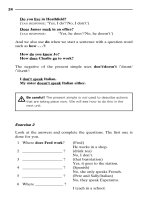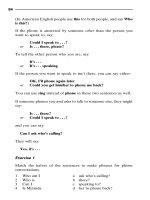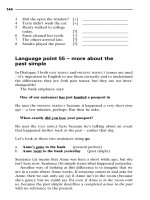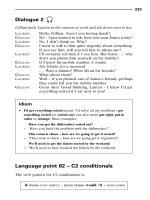English Grammar Course - part 5 docx
Bạn đang xem bản rút gọn của tài liệu. Xem và tải ngay bản đầy đủ của tài liệu tại đây (1.44 MB, 94 trang )
E_English Grammar
E_English Grammar
Chapter 4
The verb & its complementation
1. Different classifications of English verbs
2. Grammatical categories of the verb
3. Intensive complementation
4. Monotransitive complementation
5. Ditransitive complementation
6. Complextransitive complementation
Issues
Issues
Classifications of English verbs
Classifications of English verbs
1
Verb
Verb
1/1
according to
classified
Possibility of admitting
progressive aspect
Possibility of admitting
progressive aspect
Functions of items
Functions of items
Complementation
Complementation
Structure
Structure
= words or phrases
indicating an action,
an event, or a state
E.g.: kiss, break out, have
Classifications of English verbs
Classifications of English verbs
1
Verbs
Verbs
2/1
according to
classified
Functions of items
Functions of items
Lexical verbs
Lexical verbs
Auxiliary verbs
Auxiliary verbs
See more in 3.3 - 3.22
Classifications of English verbs
Classifications of English verbs
1
Verbs
Verbs
3/1
according to
classified
Functions of items
Functions of items
Lexical verbs
Lexical verbs
Auxiliary verbs
Auxiliary verbs
Regular
Regular
Irregular
Irregular
E.g.: book, booked, booked
E.g.: teach, taught, taught
Classifications of English verbs
Classifications of English verbs
1
Verbs
Verbs
4/1
according to
classified
Functions of items
Functions of items
Lexical verbs
Lexical verbs
Auxiliary verbs
Auxiliary verbs
Primary
Primary
Modal
Modal
Marginal
modal auxiliary
Marginal
modal auxiliary
Classifications of English verbs
Classifications of English verbs
1
Verbs
Verbs
5/1
according to
classified
Functions of items
Functions of items
Lexical verbs
Lexical verbs
Auxiliary verbs
Auxiliary verbs
Primary
Primary
Modal
Modal
Marginal
modal auxiliary
Marginal
modal auxiliary
•
include: do, have, be
•
change meaning when becoming a
full verb
E.g.: I am a student. vs. I am reading.
Classifications of English verbs
Classifications of English verbs
1
Verbs
Verbs
6/1
according to
classified
Functions of items
Functions of items
Lexical verbs
Lexical verbs
Auxiliary verbs
Auxiliary verbs
Primary
Primary
Modal
Modal
Marginal
modal auxiliary
Marginal
modal auxiliary
•
include:
Can – could
May – Might
Shall-should
Will-would
Must
Ought to
Classifications of English verbs
Classifications of English verbs
1
Verbs
Verbs
7/1
according to
classified
Functions of items
Functions of items
Lexical verbs
Lexical verbs
Auxiliary verbs
Auxiliary verbs
Primary
Primary
Modal
Modal
Marginal
modal auxiliary
Marginal
modal auxiliary
•
include: used to, dare, need
Classifications of English verbs
Classifications of English verbs
1
Verbs
Verbs
8/1
according to
classified
Complementation
Complementation
Intensive verbs
Intensive verbs
Extensive verbs
Extensive verbs
Classifications of English verbs
Classifications of English verbs
1
Verbs
Verbs
9/1
according to
classified
Complementation
Complementation
Intensive verbs
Intensive verbs
Current copular
Current copular
Resulting copular
Resulting copular
E.g.: be, appear, feel, look,
remain, seem
E.g.: become, get, go,
grow, turn, make
•
connect S & C
•
have the pattern:
SVC or SVA(obli)
E.g.: I feel tired.
He’s in the cab.
Extensive verbs
Extensive verbs
Classifications of English verbs
Classifications of English verbs
1
Verbs
Verbs
10/1
according to
classified
Complementation
Complementation
Extensive verbs
Extensive verbs
Intransitive
Intransitive
Transitive
Transitive
Intensive verbs
Intensive verbs
Classifications of English verbs
Classifications of English verbs
1
Verbs
Verbs
11/1
according to
classified
Complementation
Complementation
Extensive verbs
Extensive verbs
Intransitive
Intransitive
Transitive
Transitive
Intensive verbs
Intensive verbs
•
require no Object
•
have the pattern: SV
•
make complete sense
themselves
E.g.: He’s singing.
The baby cried.
Classifications of English verbs
Classifications of English verbs
1
Verbs
Verbs
12/1
according to
classified
Complementation
Complementation
Extensive verbs
Extensive verbs
Intransitive
Intransitive
Transitive
Transitive
Intensive verbs
Intensive verbs
Mono-transitive
Mono-transitive
Di-transitive
Di-transitive
Complex-transitive
Complex-transitive
Classifications of English verbs
Classifications of English verbs
1
Verbs
Verbs
13/1
according to
classified
Complementation
Complementation
Extensive verbs
Extensive verbs
Intransitive
Intransitive
Transitive
Transitive
Intensive verbs
Intensive verbs
Mono-transitive
Mono-transitive
Di-transitive
Di-transitive
Complex-transitive
Complex-transitive
•
require one direct Object (Od)
•
have the pattern: SVOd
E.g.: I kissed her.
He caught the ball.
Classifications of English verbs
Classifications of English verbs
1
Verbs
Verbs
14/1
according to
classified
Complementation
Complementation
Extensive verbs
Extensive verbs
Intransitive
Intransitive
Transitive
Transitive
Intensive verbs
Intensive verbs
Mono-transitive
Mono-transitive
Di-transitive
Di-transitive
Complex-transitive
Complex-transitive
•
require both direct Object (Od) & indirect Object (Oi)
•
have the pattern: SVOiOd
E.g.: I gave her such a lovely present.
Classifications of English verbs
Classifications of English verbs
1
Verbs
Verbs
15/1
according to
classified
Complementation
Complementation
Extensive verbs
Extensive verbs
Intransitive
Intransitive
Transitive
Transitive
Intensive verbs
Intensive verbs
Mono-transitive
Mono-transitive
Di-transitive
Di-transitive
Complex-transitive
Complex-transitive
•
require Object and Object Complement
(Co) or Obligatory Averbial (A(obli))
•
have the pattern: SVOCo or SVOA(obli)
E.g.: He made me really crazy.
He sent his son to the kindergarten.
Classifications of English verbs
Classifications of English verbs
1
Verbs
Verbs
16/1
according to
classified
Possibility of admitting
progressive aspect
Possibility of admitting
progressive aspect
Stative verbs
Stative verbs
Dynamic verbs
Dynamic verbs
See more in 3.35
Classifications of English verbs
Classifications of English verbs
1
Verbs
Verbs
17/1
according to
classified
Possibility of admitting
progressive aspect
Possibility of admitting
progressive aspect
Stative verbs
Stative verbs
Verbs of inert perception &
recognition
Verbs of inert perception &
recognition
Relational verbs
Relational verbs
= verbs that show the
condition or status
and do not accept the
progressive aspect
E.g.: I am a boy.
It feels thin.
Classifications of English verbs
Classifications of English verbs
1
Verbs
Verbs
18/1
according to
classified
Possibility of admitting
progressive aspect
Possibility of admitting
progressive aspect
Stative verbs
Stative verbs
Verbs of inert perception &
recognition
Verbs of inert perception &
recognition
Relational verbs
Relational verbs
•
adore, astonish, believe, hate, hear,
impress, know, like, etc.
E.g.: I like you
He said he hated cooking.
Classifications of English verbs
Classifications of English verbs
1
Verbs
Verbs
19/1
according to
classified
Possibility of admitting
progressive aspect
Possibility of admitting
progressive aspect
Stative verbs
Stative verbs
Verbs of inert perception &
recognition
Verbs of inert perception &
recognition
Relational verbs
Relational verbs
•
apply to, equal, deserve, involve, lack, matter, need, owe, resemble, possess,
sound, tend, etc.
E.g.: She resembles her mother.
Classifications of English verbs
Classifications of English verbs
1
Verbs
Verbs
20/1
according to
classified
Possibility of admitting
progressive aspect
Possibility of admitting
progressive aspect
Dynamic verbs
Dynamic verbs
Verbs of body sensation
Verbs of body sensation
Activity verbs
Activity verbs
Transitional event verbs
Transitional event verbs
Momentary verbs
Momentary verbs
Process verbs
Process verbs
= verbs that show the action or the
change of status
E.g.: She learns English.
He hit me.
She is English. ( ‘is’ isn’t
dynamic verb because it denotes a
permanent status)
Classifications of English verbs
Classifications of English verbs
1
Verbs
Verbs
21/1
according to
classified
Possibility of admitting
progressive aspect
Possibility of admitting
progressive aspect
Dynamic verbs
Dynamic verbs
Verbs of body sensation
Verbs of body sensation
Activities verbs
Activities verbs
Transitional event verbs
Transitional event verbs
Momentary verbs
Momentary verbs
Process verbs
Process verbs
•
ache, hurt, itch, feel, etc.
Classifications of English verbs
Classifications of English verbs
1
Verbs
Verbs
22/1
according to
classified
Possibility of admitting
progressive aspect
Possibility of admitting
progressive aspect
Dynamic verbs
Dynamic verbs
Verbs of body sensation
Verbs of body sensation
Activities verbs
Activities verbs
Transitional event verbs
Transitional event verbs
Momentary verbs
Momentary verbs
Process verbs
Process verbs
•
ask, eat, help, learn, say, throw, write etc.
Classifications of English verbs
Classifications of English verbs
1
Verbs
Verbs
23/1
according to
classified
Possibility of admitting
progressive aspect
Possibility of admitting
progressive aspect
Dynamic verbs
Dynamic verbs
Verbs of body sensation
Verbs of body sensation
Activities verbs
Activities verbs
Transitional event verbs
Transitional event verbs
Momentary verbs
Momentary verbs
Process verbs
Process verbs
•
arrive, land, leave, lose, die etc.









